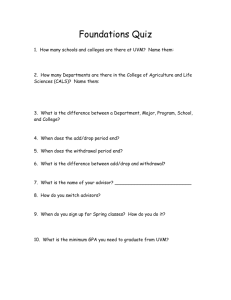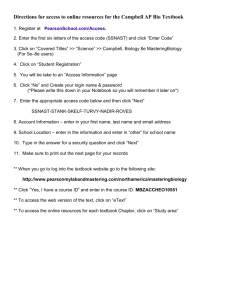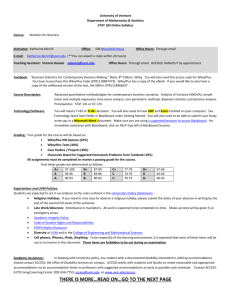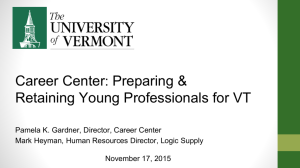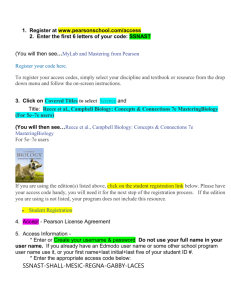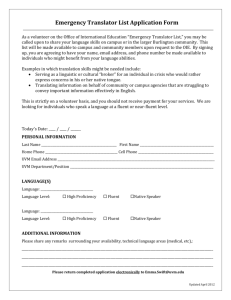BIOL 001 A and ZRA Principles of Biology Fall 2014 Mon/Wed/Fri 11
advertisement
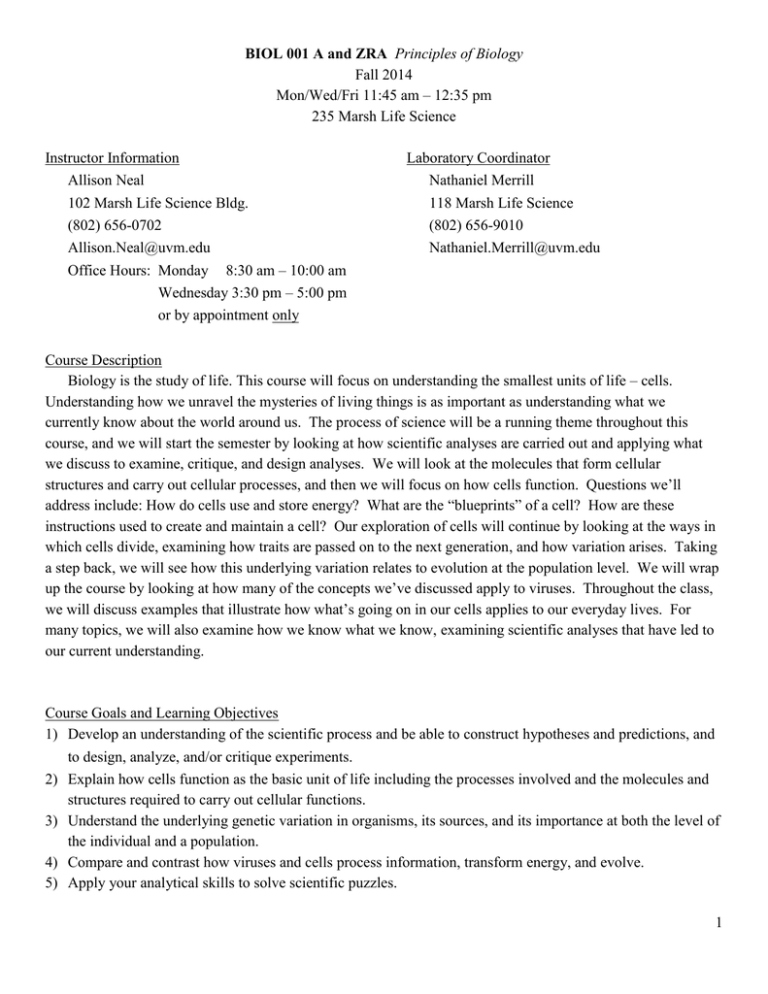
BIOL 001 A and ZRA Principles of Biology Fall 2014 Mon/Wed/Fri 11:45 am – 12:35 pm 235 Marsh Life Science Instructor Information Allison Neal 102 Marsh Life Science Bldg. (802) 656-0702 Allison.Neal@uvm.edu Office Hours: Monday 8:30 am – 10:00 am Wednesday 3:30 pm – 5:00 pm or by appointment only Laboratory Coordinator Nathaniel Merrill 118 Marsh Life Science (802) 656-9010 Nathaniel.Merrill@uvm.edu Course Description Biology is the study of life. This course will focus on understanding the smallest units of life – cells. Understanding how we unravel the mysteries of living things is as important as understanding what we currently know about the world around us. The process of science will be a running theme throughout this course, and we will start the semester by looking at how scientific analyses are carried out and applying what we discuss to examine, critique, and design analyses. We will look at the molecules that form cellular structures and carry out cellular processes, and then we will focus on how cells function. Questions we’ll address include: How do cells use and store energy? What are the “blueprints” of a cell? How are these instructions used to create and maintain a cell? Our exploration of cells will continue by looking at the ways in which cells divide, examining how traits are passed on to the next generation, and how variation arises. Taking a step back, we will see how this underlying variation relates to evolution at the population level. We will wrap up the course by looking at how many of the concepts we’ve discussed apply to viruses. Throughout the class, we will discuss examples that illustrate how what’s going on in our cells applies to our everyday lives. For many topics, we will also examine how we know what we know, examining scientific analyses that have led to our current understanding. Course Goals and Learning Objectives 1) Develop an understanding of the scientific process and be able to construct hypotheses and predictions, and to design, analyze, and/or critique experiments. 2) Explain how cells function as the basic unit of life including the processes involved and the molecules and structures required to carry out cellular functions. 3) Understand the underlying genetic variation in organisms, its sources, and its importance at both the level of the individual and a population. 4) Compare and contrast how viruses and cells process information, transform energy, and evolve. 5) Apply your analytical skills to solve scientific puzzles. 1 Laboratory Teaching Assistants Laboratory sections will be instructed by Graduate Teaching Assistants. Names and contact information will be available soon on BlackBoard. Supplemental Instructor Nathan Dreyfus is the Supplementary Instructor (SI) assigned to this course and can provide you with extra help if needed. His job is to attend lecture, take notes, and then prepare two, one hour-long review sessions each week to solidify the important concepts presented in class. More information regarding times and locations for the review sessions will be available on BlackBoard shortly after the semester starts. Course Materials 1) Campbell Biology: Concepts & Connections, 8th Edition by Reece, Taylor, Simon, and Dickey 2) MasteringBiology access 3) iClicker remote IMPORTANT: If you took BIOL 002 last spring, note that we are using the new edition of the textbook. You do NOT, however, need to purchase MasteringBiology access to the newer edition. Please contact me ASAP to arrange converting your access from the older to the newer edition. If you are planning to take BIOL 002 in the spring, you will not need to purchase any additional course materials. The class will use the same textbook, and MasteringBiology access is valid for one year from date of registration. The textbook for this course is Campbell Biology: Concepts & Connections, 8th Edition by Reece, Taylor, Simon, and Dickey. There are a few copies on reserve at the library. Required readings from the textbook will be assigned for each class. For some topics, readings from other sources will also be assigned. External readings (web links or pdf files) will be available on BlackBoard. Access to MasteringBiology (on-line assignments and study guide) is also required. New textbooks packaged with Mastering Biology access and access to an electronic version of the text (eText) are available from the bookstore. If you purchased a used copy or different edition, you will need to buy MasteringBiology access separately on-line. Please note that MasteringBiology has an electronic version of the textbook that may be used in lieu of a hard copy. If you wish to purchase only the eText version, you may do so when purchasing access to MasteringBiology. Access without the eText is $60.50 and with the eText is $91.30. Note that codes are textbook-specific, so be sure that you select the correct text and edition (see above). Instructions for registering and purchasing access are posted on BlackBoard. You must register and complete the introductory assignment BEFORE midnight on Sunday, August 31st. Additionally, I encourage you to use the study area on the website. It contains many animations and simulations that you may find helpful as well as pre- and posttests for each chapter. Concept tests will be administered during each class using iClickers. You must obtain an iClicker remote and register it on-line BEFORE class on Wednesday, August 27th. Registration instructions are available on BlackBoard. Please see the section titled “Participation” for further details regarding iClicker use. 2 Lecture handouts will be posted on BlackBoard prior to class and full lecture slides will be available after class. Lecture handouts are lecture slides with key information left blank. You may find it helpful to print lecture handouts before class to facilitate note taking. It is also to your benefit to go through the full lecture slides after each class and review the discussion questions, concept tests, and the follow-up questions provided at the end of each lecture. The lecture follow-up questions are questions you should be able to answer based on concepts covered in class. They can be particularly helpful in allowing you to apply the concepts and assess your understanding of the material. Whenever possible, videos and supplemental material used in class will also be posted on BlackBoard. A list of key vocabulary words will be posted on BlackBoard before we begin a new topic in class. Reviewing the terms and making sure that you understand their meanings will help you be better prepared to understand what we discuss in lecture and will help you when studying for exams. Class Policies Laptops will be allowed for note taking purposes. Please sit in the front center section of the classroom if you wish to use your laptop. Anyone found using their laptop for something not related to class material will lose laptop privileges for the remainder of the course. All other electronics (e.g. cell phones, iPods) must be turned off and kept OFF your desk. Use of electronic devices is especially distracting in a large class such as this, so please be courteous to your classmates and help create a positive learning environment. Attendance is crucial. We will discuss various concepts that are not directly covered in your text, and examine others more or less deeply than the book. You are only responsible for the material we cover in lecture, which includes class discussion questions and activities. If you are not present in class, you lose the benefit of participating in the discussions/activities and the knowledge gained from these interactions. If you miss class due to an illness or UVM event, please contact me to set up a time to review the material you missed. Questions are welcomed and encouraged at all times. If something is not clear, please let me know. If you find yourself struggling, please make an effort to meet with me as soon as possible so that you do not fall behind. Grading No extra credit assignments will be offered and exams will not be curved. Please be aware that laboratory scores may be adjusted at the end of the semester before determining final grades. In addition, you must receive a passing grade (>60%) in the laboratory to pass the course. The scale for final letter grades will be determined at the end of the semester, but will not be more stringent than the standard cutoffs. Participation MasteringBiology Assignments Exams 1 – 3 Final exam Laboratory TOTAL 6 points 14 points 14 points each (42 points total) 18 points 20 points (passing grade required to pass the course) 100 points 3 MasteringBiology Homework Assignments Weekly homework assignments will be posted on MasteringBiology (www.masteringbiology.com) to give you practice applying the material covered in class and assess your understanding of the course concepts. You must register for the course on the MasteringBiology website to be able to access the assignments. Each assignment will consist of activities and/or questions that cover material discussed in class. Assignments will be available on Wednesdays at 5:00pm and are due on Sundays BEFORE midnight (11:59pm) unless otherwise noted on the lecture schedule. Please note that assignments are still due on weeks when you have an exam. There will be a total of 12 assignments, and your lowest score will be dropped. Late homeworks will not be accepted. In addition, there will be an introductory assignment that is mandatory, but not graded. Completion of the introductory assignment will count for points towards your Participation score. Participation Concept tests will be given during each class period using the iClicker system. These questions are designed to help you develop your application, analysis, and evaluation skills using the concepts we discuss in class. Additionally, concept tests will be geared towards promoting peer instruction and class discussions, and will allow both you and me to assess your preparation for class and understanding of new material. One point will be given for every response received, and an additional point will be awarded for the correct response. Each student is expected to enter their own response using their registered iClicker remote. If students are found entering responses using their classmates’ remotes, each student will lose ALL concept test points for the semester. In addition to concept tests, we will periodically have in-class activities, some of which may count for points towards your participation score. Like the concept tests, these activities will be designed to promote peer instruction and to give me feedback on your grasp of course concepts. Importantly, the activities will give you additional practice applying the material we discuss. Concept tests and in-class activities may not be madeup except in the instance of an extended excused absence. Final participation scores will be calculated using the rubric below. Percentage Score Final Score (points) 80-100 6 70-79.9 5 60-69.9 4 50-59.9 3 40-49.9 2 0-39.9% 1 4 Exams There will be four exams distributed over the course of the semester (see lecture schedule for specific dates). Exams will consist primarily of multiple-choice questions with some short answer questions. A study guide containing exam details, study tips, and relevant lecture follow-up questions will be available on BlackBoard approximately one week prior to each exam. Note that your fourth (final) exam is cumulative. Please be sure to bring a #2 pencil and an eraser with you to all exams. Make-up exams will be given only in emergency situations. Any student who will miss an exam must contact me BEFORE the exam is scheduled to begin. Except in special circumstances, an excuse from your Dean’s office or other documentation will also be required. If you have a conflict with the final exam, you must let me know before Friday, November 21st. Laboratory Laboratory projects consist of a mix of hands-on and computer-simulated activities, and are designed to give you experience in experimental science and extend the material covered in lecture. Sections are directed by experienced Graduate Teaching Assistants. The laboratory is an important component of this course and can significantly affect your grade. Please refer to the Laboratory BlackBoard website for the lab manual and additional information regarding expectations and grading. There are no additional course materials required for lab, but you will need to print the lab manual handouts and bring them with you to lab. Please be aware that, as stated above, you must receive a passing grade (>60%) for the laboratory component to pass the course. 5 UVM Policies Below are links to various UVM polices you may find useful. Course Materials Property Rights: Consistent with the University’s policy on intellectual property rights, it is the College of Agriculture and Life Science’s policy that teaching and curricular materials (including but not limited to classroom lectures, class notes, exams, handouts, and presentations) are the property of the instructor. Therefore, electronic recording and/or transmission of classes or class notes (i.e. selling or posting) is prohibited without the express written permission of the instructor. Such permission is to be considered unique to the needs of an individual student (e.g. ADA compliance), and not a license for permanent retention or electronic dissemination to others. For more information, please see the UVM policy on Intellectual Property, sections 2.1.3 and 2.4.1. Academic Integrity: The policy addresses plagiarism, fabrication, collusion, and cheating. www.uvm.edu/~uvmppg/ppg/student/acadintegrity.pdf Rights and Responsibilities of Undergraduate Students: Addresses multiple topics including academic conduct and religious holidays. http://www.uvm.edu/academics/catalogue200607/?Page=allpolicies.php&SM=policymenu.html&category=academic_policies&policy=Rights%20and%20Respons ibilities%20of%20Undergraduate%20Students Religious Holidays: Students have the right to practice the religion of their choice. Each semester students should submit in writing to their instructors by the end of the second full week of classes their documented religious holiday schedule for the semester. You will be permitted to make up work within a mutually agreed-upon time. Student Learning Accommodations: In keeping with University policy, any student with a documented disability interested in utilizing accommodations should contact ACCESS, the office of Disability Services on campus. A170 Living/Learning Center; 802-656-7753; access@uvm.edu; www.uvm.edu/access www.uvm.edu/~uvmppg/ppg/student/disability.pdf Grade Appeals: If you would like to contest a grade, please follow the procedures outlined in this policy: www.uvm.edu/~uvmppg/ppg/student/gradeappeals.pdf Grading: Information on grading and GPA calculation. http://www.uvm.edu/academics/catalogue2010-11/?Page=allpolicies.php&SM=policymenu.html&policy=Grading Code of Student Rights and Responsibilities: www.uvm.edu/~uvmppg/ppg/student/studentcode.pdf Final exam policy: The University final exam policy outlines expectations during final exams and explains timing and process of examination period. www.uvm.edu/academics/catalogue2010-11/?Page=allpolicies.php&SM=policymenu.html&policy=Examinations 6
